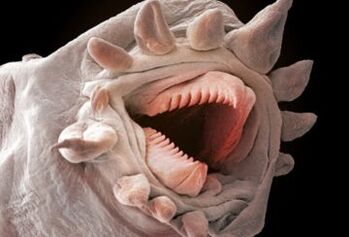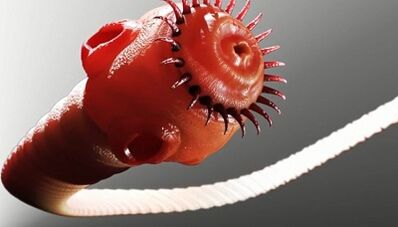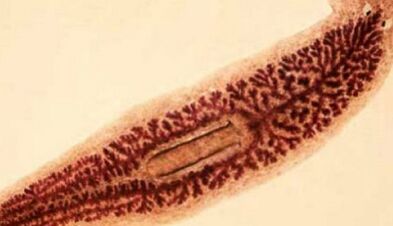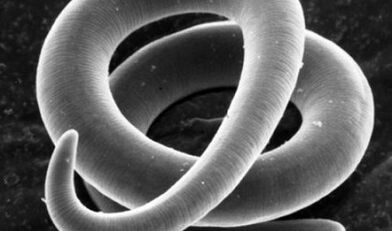
Even the development of technology and household chemicals and various cleaning agents cannot eliminate parasitic infections from our society.The first reason is dirty hands.
Some types of worms are not dangerous to humans and can be removed from the body without difficulty.However, parasitologists also know the people who kill their prey.
What worms can live inside us?
Worms can colonize animals and humans.It is not for nothing that they are called parasites, for they feed on the resources of the body they infect.Worms not only cause harm by eating the food we're supposed to be eating, they can also disrupt the normal function of the liver, heart, lungs, and other organs.There are known cases of them penetrating hearing aids, eyes and brains.
Experts divide those who most often come as uninvited guests into three groups.These types of parasites have become the most numerous parasites to infect, as more than 70% of recorded infections belong to them.
Here is their brief description:
- roundwormsA combination of pinworms, roundworms and the so-called dog roundworm (another name is Toxocara).
- Protozoan parasites.These include lamblia, amoeba, toxoplasmosis and malaria Plasmodium.
- Flatworms.This category includes Echinococcus, tapeworm (diphyllobothriasis), and bovine tapeworm.
The cause of helminthiasis (helminth infection) may be any of 150 species of parasitic organisms.Scientists have discovered more of this.There are 12,000 species of worms known to science.Next let's consider what worms live in the human body.
The most common types are:
- Pinworms.Very small white worms that live and reproduce in the gastrointestinal tract of prey.This type of worm causes the most harm because it disrupts the intestinal microbiome.This negative impact can lead to genitourinary disorders, pinworm disease, neurological disorders, and retardation of physical growth and mental development.The main routes of human infection are dirty hands, unwashed food and pets.
- roundworms.These worms develop inside the human body and can sometimes reach lengths of up to 0.4 meters.Roundworms are able to move from their permanent habitat in the intestines to the lung area.During their journey, the worms damage tissue, causing it to bleed.When the larvae are coughed up from the upper respiratory tract, they enter the mouth and are swallowed into the digestive system.Outside observers can confuse this cough with a cold.They also cause harm by poisoning the gut microbiome with toxins.In turn, they feed on substances that are useful to us.Intoxication of the body can lead to allergies, asthma attacks, and suffocation.Dirty hands are a favorite way for tapeworms to spread when they transfer to a new body.
- Whipworm.In terms of the number of infections, he deserves to be ranked third.The worm enters the body of new victims through poorly processed food.It causes whipworm disease.The patient had a loss of appetite and complained of abdominal pain, anemia, and diarrhea.The external manifestations of the disease cannot be immediately distinguished from an attack of appendicitis.
- Wide tape.In a sense, this worm is known as the length champion, as it can sometimes reach 10 meters or more.But there are many more real parasites.Solved by eating freshwater fish.The worm sucks from the "master" everything that should strengthen and nourish the person himself.It is not selective in its damage to organs and can harm anyone.Symptoms of this worm infection include headache, hallucinations (if it invades the brain), nausea, and vomiting.Its behavior and partial appearance are similar to pork and cattle tapeworms, but they are longer than this worm.
- hookwormWill not penetrate food and mouth.Their route of entry is different because they infect us through the skin.Living in contaminated soil, they appear to be waiting for contact with humans.They are dangerous in that hookworms can damage the intestines and lungs and also feed on the blood.Symptoms are related to abdominal pain and problems with esophageal function.
- Trichinella spiralis.Worm infections can occur when eating meat, especially game.Their presence in the body produces the following external manifestations:
- stomach ache;
- itching;
- High temperature (two weeks after moving in);
- intestinal diseases;
- rash.
- liver flukesThe disease can colonize the human body through the consumption of fish previously affected by it.This worm can cause damage to the gallbladder and intestines.Symptoms of fluke infection: Allergy and nausea, abdominal pain and cramping, joint pain, and high fever.If the disease has become chronic, the next stage may be hepatitis.The more dire consequences of liver fluke infection are cirrhosis and cancer.If this parasite is eliminated, the damage it causes will be quite obvious, causing inflammation of the liver.
- Echinococcus tapeworm.Tapeworms are also quite large in length, up to 5 meters in length.They are parasitic on dogs, wolves and cats.When a person comes into contact with them, the worms first damage the intestines and then migrate throughout the body.Their favorite places to colonize are the liver and lungs.Where they are located, they are misdiagnosed as cancerous tumors or cysts.Some doctors use the term "cyst" because it looks like a growth and is very large in size.When a hypothetical tumor ruptures, its contents can acutely poison the entire body.
important.The worm can cause damage to a person's limbs and facial musculature, damage the respiratory system and even the heart, leading to death.

People sometimes overlook worm infections, viewing them as an unpleasant but easily tolerated disease.Therefore, their beliefs do not encourage them to be extra cautious when dealing with any dirt, poorly processed foods, or with pets.
This type of criminal negligence has tragic consequences.In addition to pain and organ damage, the worms can kill their prey.The most dangerous are worms that feed on human blood and useful substances.
The difference between parasites is the degree of damage they cause and the way they invade the body of their new "host."Echinococci are known for forming cysts, bovine tapeworms damage the intestines, and opisthorchis always feed on the liver.She misses a certain number of cells every day.
Protozoan parasites multiply very quickly when the right conditions are created.Giardia seems to hide for a while without showing any signs of infection.Toxoplasma hits a person on the head and affects his brain, thereby affecting the victim's behavior.
Plasmodium destroys blood cells and can cause the victim's death.
Consequences of infection:
- development of malignant tumors;
- Decreased immunity;
- Metabolism is disturbed.
Most often, worms inhabit the intestines, liver, and lungs.Some cases show damage to muscle tissue, joints, eyes and brain.Due to blood flow, parasites are able to migrate throughout the body, causing problems wherever they appear.
Symptoms of parasite presence
The symptoms of helminth infection vary.But they also share symptoms:

- Reduced muscle pain and swelling;
- Joints hurt, but not injured;
- enlargement of the liver and spleen;
- rash;
- high temperature.
To it you can add:
- Itching near the anus, abdominal pain, gastrointestinal disorders, constipation, vomiting, diarrhea and bloating, even intestinal obstruction, the person becomes weak and complains of anemia;
- Poisoning by parasitic secretions can disrupt the function of the nervous system, causing headaches, dizziness, and nausea.Since the parasite eats substances designed to increase the body's strength, the body becomes weak, often feels sleepy, unexplained fatigue, restless sleep, and even difficulty in performing serious mental work;
- Symptoms of skin itching and allergies, hives, brittle hair and nails, bronchial asthma, rhinitis and dry cough;
- Decreased immunity is susceptible to various infections, and inflammation of the mouth and nose can lead to stomatitis, sinusitis, and sinusitis;
- Women can develop inflammation of the appendages and have a fishy-smelling discharge (bacterial vaginosis).
Worms sometimes leave the infected person's body in such a state that even after removal, a completely healthy life is no longer possible.Therefore, if you notice any symptoms, you should consult your doctor immediately.
Pictures of worms that can live inside your body
Worms of different types, sizes and shapes can colonize the human body.They use any means of migration to live at the expense of others.It is believed that 4/5 of the planet’s population suffers from helminth infections and carries various parasites.A person may not even realize that he is not the only one eating food, he is also a "tenant" in his intestines.
The symptoms of their presence are not immediately and not clearly expressed to everyone.If bugs stay for a long time, they can cause chronic diseases in the body.Many diseases are believed to be caused by worms.Before starting treatment, you must first recognize your inner enemy and do not fight blindly.
Worms that live in humans are divided into the following categories:
- roundworms;
- tapeworm;
- lucky.
Even looking at a picture of a parasite is not a very pleasant experience, but carrying it around with you is even worse.People think other people may be infected, but it doesn't affect me.How shocked they were when they discovered that a monster had come and inhabited their bodies!

With these materials, smart people will be better equipped to protect themselves and their loved ones.But no one should do anything on their own to get rid of uninvited guests.
If the parasites are different, the treatments are not always the same.They don't offer the same pills for lice and roundworms; there are significant differences in lifestyle, where you live, and how you get infected.First, the type of worm and the direction of its harmful activity are determined, and then the doctor chooses the drug based on each patient's age and other health characteristics.
Therefore, after getting enough information about the type of worm, symptoms and degree of damage, the reader can make a diagnosis and go through the appropriate tests prescribed by a parasitologist.Not all worms are equally dangerous, but any type of them can poison the body with the waste products of their life activities, and every worm feeds on something in us: food or body tissue.
For reference.The word "parasite" comes from the Greek word meaning "parasite".Two or more organisms coexist, but one "sits on the neck" of the other, feeding and reproducing at the expense of the others.The digestive system can contain multicellular worms and protozoa.Tapeworms, roundworms, and pinworms are common.Their body structure is relatively complex.
The vast majority of worms have a negative impact on a person's overall well-being and health, causing very serious illnesses.Keep this in mind, when the first symptoms of an illness appear and do not go away despite treatment for a cold or rash accompanied by a headache, you should consult your doctor to make an appointment for diagnosis.
Today, doctors have sufficient methods and high-precision techniques to confirm or refute suspicion of parasitic infection.If worms are detected, then only an expert can choose the best treatment option.
How to prevent worm infection?Do you need to constantly limit yourself to one holiday or another, "squeezing" your life into a vice by adhering to complex assumptions?
In fact, intestinal parasite infection and subsequent treatment can be avoided if very simple rules are followed:
- Wash hands with soap only;
- drink filtered water;
- Fruits and vegetables should not only be washed with water, but also preferably rinsed with boiling water;
- Swimming in polluted waters is not allowed;
- Meat and fish products must undergo forced heat treatment;
- Toys used by children outdoors are disinfected;
- Vaccinate pets against parasites.
in conclusion
But everyone needs to start with themselves, because all modern achievements mean nothing if you simply neglect personal hygiene and precautions for the family living in your home.Paying attention to your health, detecting infection promptly (if it occurs), and initiating treatment promptly and effectively - all of this will help prevent catastrophe on an individual level and the spread of the disease in your environment.
It is much easier to prevent parasites than to suffer from poor health, various illnesses and fevers and to follow the rules.It’s just that this is no longer a hygienic process, but treatment, diet and immunity restoration.It's also fine if you don't have surgery.Take care of yourself, it's easier that way.



























